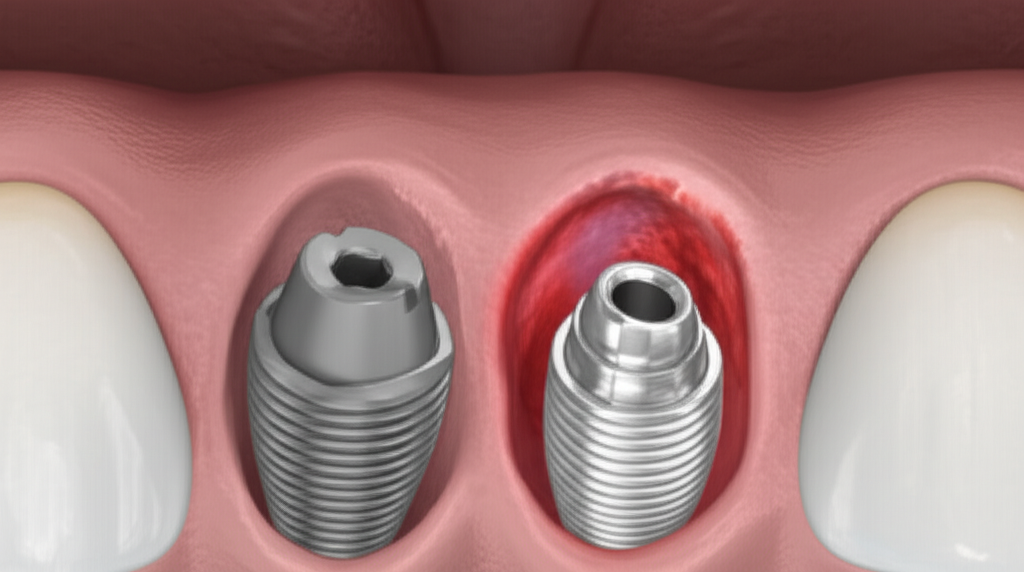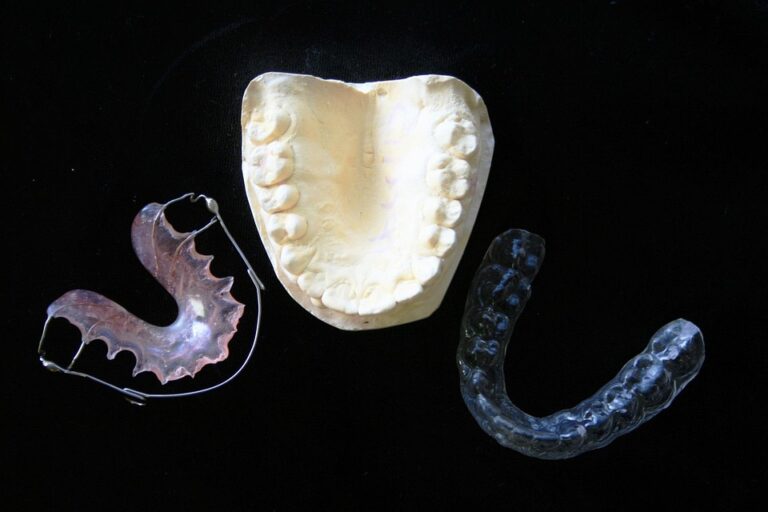
How to Know if Your Dental Implant is Failing: A Simple Guide
Meta Description: Worried about your dental implant? Learn the signs of a failing implant, common reasons, and what you should do if something seems wrong. Get easy-to-follow advice.
Table of Contents
- Pain or Discomfort
- Swelling, Redness, or Inflammation
- Implant Mobility or Looseness
- Gum Recession or Bone Loss
- Other Concerning Signs
- Early Implant Failure
- Late Implant Failure
- Non-Surgical Approaches
- Surgical Interventions
- Long-Term Management
Article Outline Overview
Before we get started, here’s a quick look at what’s inside:
- A quick intro to dental implant failure and why it matters, plus how to tell healing from real problems.
- The main warning signs that your dental implant might be failing—based on real-life experience, not just medical books.
- What you should do right away if you think something’s wrong.
- The usual reasons implants fail at different times.
- How your dentist figures out if your implant is failing (with a story from my own life).
- A simple guide to what treatments are out there—what they’re like and what to expect.
- Tips on how to keep your implant safe in the first place.
- A friendly ending to help you feel ready to take care of your mouth.
Introduction: Understanding Dental Implant Failure
I’ve had my share of dental work, so I know how it feels to be worried about a new dental implant. Dental implants have given millions of people—me included—their smile and confidence back. Most of the time, they work great. But if something seems off, it’s easy to worry.
After my own implant surgery, I found myself asking, “Is this normal healing, or is something wrong?” The truth is, dental implant failure is rare; they work about 95% to 98% of the time. But knowing what to watch for and acting quickly can make a big difference if your implant starts to have problems.
Figuring out if your implant is failing isn’t about worrying over every little ache, but knowing what’s okay and what isn’t. Having that info made me feel much better and more in control.
Let’s go step by step through what you need to know, from strange pains to feeling something move, with easy language and tips you can use right now.
Key Signs and Symptoms of a Failing Dental Implant
With my own experiences and lots of talks with dentists, I found out failing implants almost always give you hints. The tough part is telling the difference between normal healing and a true warning sign.
Pain or Discomfort
The first few days after my surgery hurt, but that faded. If your pain gets worse, comes back after a break, or wakes you up at night weeks or months later, pay attention.
- Pain that Won’t Go Away or Gets Worse: If it aches or throbs around the implant or hurts when you bite down, days or weeks after surgery, this is not normal.
- Hurts to Chew or Put Pressure: If biting down still feels sore or bruised weeks later, don’t just hope it gets better.
I used to think a little pain was just part of it, but pain that hangs around or gets worse is a big warning.
Swelling, Redness, or Inflammation
A little swelling is normal at first. But if your gums are still swollen or red weeks after your procedure—or if the puffiness gets worse—something could be wrong.
- Red or Sore Gums by the Implant: Healthy gums should slowly go back to their normal look and feel.
- Pus or Discharge: If you notice any oozing or a bad smell/taste coming from the implant area, that usually means infection. I’ve seen friends ignore it hoping it would pass, but you really need to see a dentist.
- Bad Taste or Smelly Breath: If mouthwash can’t fix a bad taste or breath, bacteria around your implant could be to blame.
Implant Mobility or Looseness
It’s important to know the difference between a loose crown and a loose implant post. I once felt my crown moving—turned out, it just needed to be tightened. But if the actual metal post feels loose, that’s not good.
- Loose or Wobbly Implant/Crown: If you can move the implant with your tongue or finger, or it feels wobbly when you eat, that could mean the bone isn’t holding it.
- Weird Feeling When You Chew: If eating feels painful or you hear it click or shift, a healthy implant shouldn’t move.
Gum Recession or Bone Loss
Most of us don’t study our gum lines, but after my implant, I started taking a good look. If your gum pulls away and you see more of the implant sticking out, watch out.
- Gums Peeled Back (“Longer” Implant): If you spot more metal or the gum doesn’t match up with nearby teeth, that’s a sign to call your dentist.
- Change in How the Gum Looks: The gum pulls back, sinks down, or looks different than it did before.
- Bone Loss (as shown on X-rays): Your dentist may notice bone loss, but if you see a dip by your implant, bring it up at your dental visit.
Other Signs to Watch For
Every mouth is a bit different, but some symptoms always mean you should call your dentist, fast:
- Numb, Tingly, or Weird Feeling: If your lip, chin, or tongue randomly feels numb or tingly (outside of right after surgery), this could mean a nerve is being bothered.
- Bleeding That Won’t Stop: If you keep seeing blood on your pillow, gums, or when you brush weeks after surgery, it’s time for a check.
- Having Trouble Eating or Talking: If your bite feels off, it hurts to talk or chew, or you hear strange sounds, your implant might be moving too much.
When to Seek Immediate Professional Help
This is where you should listen to your gut. If you feel something isn’t right—especially if you’ve noticed any of those warning signs—call your dentist as soon as you can.
Don’t try to figure this out on your own or just use saltwater or over-the-counter cures. I waited a bit too long once, hoping it’d “just go away,” but it got worse. Your dentist (or an oral surgeon or specialist) can look at your implant the right way.
If you spot pus, have pain that won’t stop, or the implant moves, don’t wait for your normal check-up. The sooner you get help, the better your chances for a simple fix. Waiting can turn a small problem into a big one.
Common Causes of Dental Implant Failure
I used to think implant failure was just bad luck, but there are real reasons why it happens—some early, some much later.
Early Implant Failure (First Few Months)
When my implant was new, I was nervous. Early failure usually means the implant didn’t connect to your bone like it should (something called “osseointegration”), or an infection happened early on.
- Didn’t Connect to Bone Right: If your body doesn’t hold the implant in tight, or there’s pain and healing seems off, the implant might not have settled in.
- Infection After Surgery: Bacteria getting in during healing can cause things to go wrong from the start.
- Put in Wrong or in Bad Spot: If the implant is placed at the wrong angle or bone isn’t strong enough, a good hold is harder.
- Too Much Chewing or an Injury: Eating hard stuff too soon, or a knock to the jaw, can mess up healing.
- Health Problems (Like Smoking or Diabetes): Healing is slower if your overall health is not good. For example, smokers and people with uncontrolled diabetes have a much higher risk.
Late Implant Failure (After It’s Healed, Even Years Later)
One time, my family member had their implant for years, then suddenly got swelling and bleeding. Implants can fail later on too.
- Gum Disease Around the Implant (Peri-Implantitis): This is like normal gum disease but at your implant site. Gums swell, bleed, and bone can start to fade away.
- Infections that Keep Coming Back or Bone Going Away: Bacteria over time, or not-so-great cleaning, let bone break down where the implant is.
- Mechanical Trouble: If you grind your teeth while you sleep, get hit in the mouth, or if a screw is loose, the implant can weaken.
- Bite Is Not Right/Too Much Pressure: If your other teeth or jaw push hard on the implant, problems can build up fast. This is why regular dentist visits matter.
- Changes in Health: Some medicines or diseases (like ones that thin your bones or weaken your immune system) can make implants harder to keep.
Diagnosing a Failing Dental Implant
When something seemed not right with my implant, my dentist checked a bunch of things to be sure.
- Dental Exam: They looked closely at my gums, checked for redness, puffiness, or pus, and poked gently around the implant.
- Checking for Movement: With a simple tool, the dentist tried to wiggle the implant lightly (a healthy one shouldn’t move at all).
- Taking X-Rays: Pictures like X-rays or 3D scans showed what the bone looks like around my implant, and if it was staying strong.
- Bacteria Testing: If they saw signs of infection, sometimes the dentist took a little sample to see what kind of germs might be causing the problem.
Doing all this helped figure out the real issue and what could be done. In my experience, a clear check let me know how things really were—even if I was worried.
If you’re interested in how technology helps with these checks, modern clinics often use a digital dental lab for better scans and making sure replacement teeth fit just right.
Treatment Options for a Failing Dental Implant
Hearing that my implant might have a problem was scary. But what they do to fix it was more straightforward than I thought. Here’s what could happen if you find out your implant isn’t doing well.
Non-Surgical Fixes
- Antibiotics or Anti-Inflammatories: Fast infections sometimes can be cleared up if you start medicines right away.
- Deep Cleaning: A dentist can clean all the way around the implant—even down in the gums if needed.
- Better Cleaning Habits: My dentist taught me special ways to clean around the implant. Sometimes just brushing and flossing the right way helps a lot.
Surgical Treatments
If cleaning and meds don’t solve it—or if your bone is starting to disappear—more work may be needed.
- Flap Surgery: The dentist lifts the gum to clean out infection or smooth out rough spots. I haven’t had this, but friends told me it helped them.
- Bone Grafting: If you lose bone, they might add some special bone material there and let it heal before putting in a new implant.
- Gum Grafting: If your gum pulls back, they can take a small piece from somewhere else in your mouth and use it to cover up the implant.
- Removing and Replacing the Implant: If the implant just won’t heal, taking it out and putting a new one in after everything’s fixed is sometimes necessary.
Want to know how new parts like crowns or screws are made? Today, implant dental laboratories use cool digital tools to make sure everything fits right.
Keeping Things Good
After you’ve fixed any big issues, staying on top of things matters.
- Regular Check-Ups: Your dentist might want to see you more often to check on things.
- New Care Routine: They may suggest a different toothbrush, special tools, or a mouth guard (especially if you grind your teeth a lot).
Preventing Dental Implant Failure
After all I went through, I made prevention my goal. This is what I do (and what my dentist says works best):
- Keep Your Mouth Clean: I brush twice a day, floss every day, and sometimes use mouthwash—especially around my implant.
- Never Skip Dentist Visits: Regular cleanings and check-ups catch problems when they’re tiny.
- If You Grind Your Teeth, Use a Night Guard: I got a custom one from a night guard dental lab to protect my teeth and implants while I sleep.
- Control Health Problems: I keep my diabetes in check, don’t smoke, and do what my doctor tells me to stay healthy.
- Do What Your Dentist Tells You After Surgery: No shortcuts. Rinse, brush, and keep appointments, it all matters.
Want to learn even more about healthy teeth? Check out the info on teeth health.
Conclusion: Prioritizing Your Oral Health
Here’s what I learned from my own ups and downs with my implant: If something feels wrong, don’t wait. Finding problems early and acting fast saves you pain, time, and often money, too.
Almost all implant problems can be fixed—if you don’t keep hoping they’ll just go away. Make dentist visits a habit, take care when brushing and flossing, and reach out for help if you’re worried, even a little.
It’s normal to be anxious, but by knowing what a failing implant looks like and acting quickly, you’re taking care of your smile for many years. Your mouth—and your peace of mind—will thank you.
If you want to know how modern dental parts get made, have a look at a china dental lab or find helpful tips on dental care. And if you still have questions, just bring them up at your next dental visit. Always remember, your health is worth checking on, every time.








